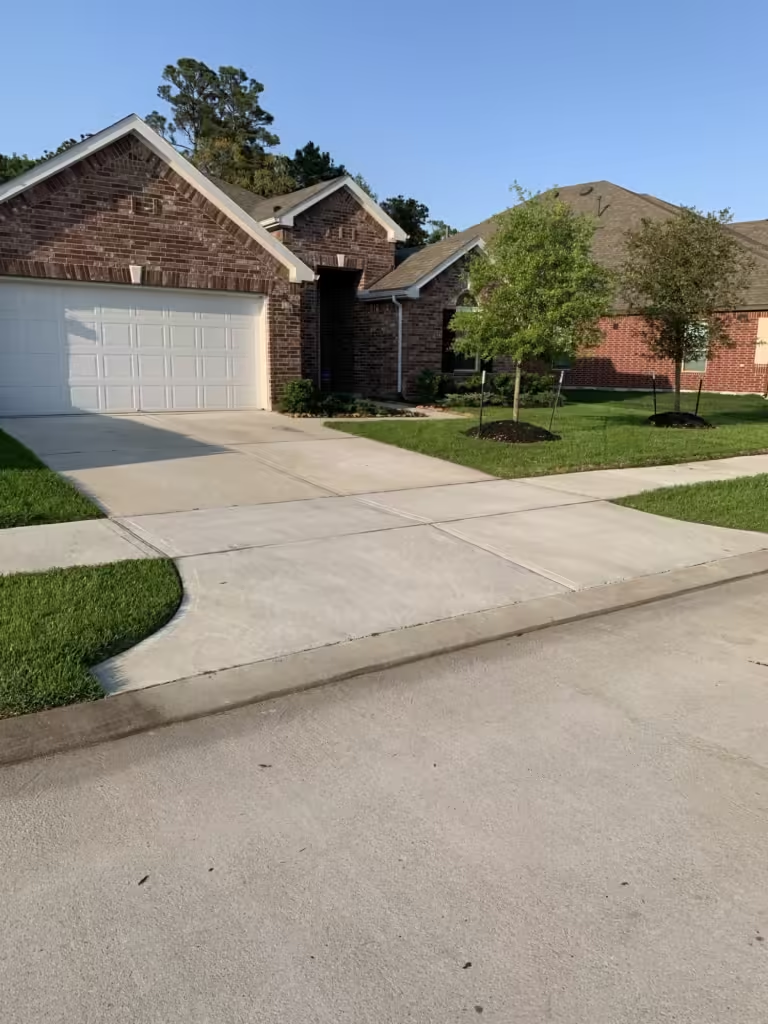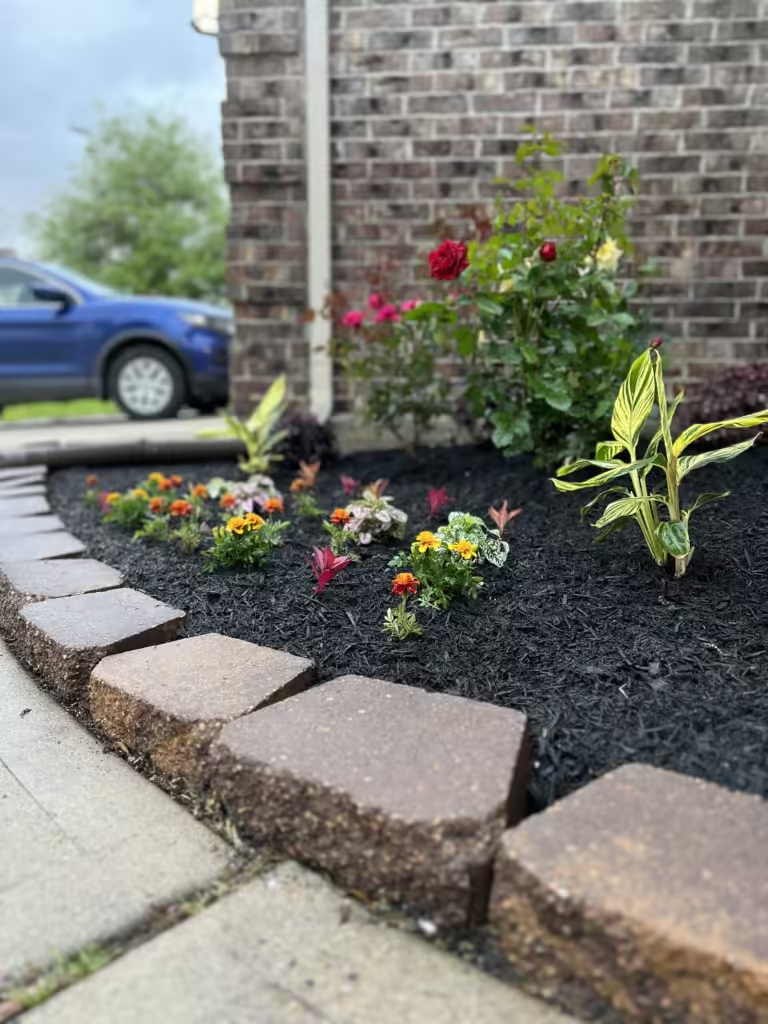In Houston’s unique climate, maintaining a vibrant and sustainable lawn requires more than just regular mowing. Embracing organic fertilization and prioritizing soil health can significantly enhance your property’s curb appeal while aligning with environmentally conscious practices.
However, it’s essential to approach landscaping with a mindset of progress, not perfection. Like life, your lawn is an evolving process—striving for improvement while respecting nature’s imperfections is key to achieving a truly mindful and balanced outdoor space. This guide offers homeowners and business owners in Houston insights into the advantages of organic lawn care and practical steps to implement these methods effectively.
Understanding Organic Fertilization
Organic fertilization involves using natural materials—such as compost, manure, and bone meal—to enrich the soil. Unlike synthetic fertilizers, organic options release nutrients slowly, ensuring a steady supply to your grass and plants. This gradual release reduces the risk of over-fertilization and nutrient runoff, promoting a healthier ecosystem.
Benefits of Organic Fertilization
Improved Soil Structure – The Foundation of a Thriving Landscape
Soil structure is the backbone of a healthy lawn and landscape. By incorporating organic matter like compost, aged manure, or leaf mold, you can transform your soil into a thriving environment for plant growth. Organic matter binds soil particles into aggregates, creating:
- Better Aeration: Roots need oxygen to grow. Improved aeration allows air to penetrate deep into the soil, promoting healthier roots and supporting microbial life.
- Enhanced Water Retention: Organic matter acts like a sponge, soaking up water and releasing it slowly, essential in Houston’s clay and sandy soils. Clay soils become less compact and more workable, while sandy soils retain water better.
By improving soil texture with organic materials, homeowners and business owners in Houston can create an optimal environment where roots thrive, even in challenging weather conditions.
Enhanced Microbial Activity – Nature’s Invisible Workforce
Healthy soil is alive with beneficial microorganisms, and organic fertilization helps them flourish. Microbial activity in your soil provides a range of benefits:
- Nutrient Recycling: Beneficial microbes break down organic materials, releasing nutrients like nitrogen, phosphorus, and potassium in forms plants can absorb.
- Natural Disease Suppression: By outcompeting harmful pathogens, beneficial microbes reduce the risk of root rot, fungal diseases, and other soil-borne problems.
- Improved Soil Ecosystem: Organic fertilizers encourage the growth of mycorrhizal fungi, which form symbiotic relationships with plant roots, improving nutrient uptake.
When you feed the soil, you’re not just helping plants grow—you’re cultivating a self-sustaining ecosystem that promotes long-term lawn and garden health.
Environmental Safety – Protecting Houston’s Natural Resources
Chemical fertilizers can harm the environment through nutrient runoff, which pollutes Houston’s waterways and disrupts local ecosystems. Organic fertilization is a safer, eco-friendly alternative:
- Slow-Release Nutrients: Organic materials break down gradually, reducing the risk of excess nutrients washing into rivers and streams.
- Improved Nutrient Retention: Organic matter binds nutrients, ensuring they remain in the soil where plants can use them, instead of being lost to runoff.
- Wildlife-Friendly Practices: By avoiding synthetic chemicals, you protect pollinators, birds, and other wildlife that contribute to the health of your garden.
Switching to organic fertilization not only benefits your lawn but also safeguards Houston’s bayous and natural habitats for future generations.
Long-Term Sustainability – Building Resilient Soil
Organic lawn care is an investment in the future of your soil and landscape. Over time, it leads to:
- Increased Soil Fertility: Organic matter boosts soil carbon levels, which improve fertility and water-holding capacity.
- Erosion Control: Healthy soil resists erosion caused by heavy rains and foot traffic, preserving your landscape.
- Reduced Dependence on Chemicals: As soil health improves, you’ll need less fertilizer and fewer pesticides, saving money and reducing environmental impact.
By adopting organic practices, you create a resilient lawn that thrives year after year with minimal intervention.
Mindful Landscaping – Progress Over Perfection
Perfection isn’t the goal in landscaping—balance and progress are. Mindful landscaping embraces the imperfections of nature while striving for improvement.
- Work with Nature: Understand your soil and climate to create a landscape that thrives naturally.
- Focus on Sustainability: Choose methods that promote long-term health and require fewer resources.
- Celebrate Imperfection: Bare patches or uneven growth are part of a living system’s natural ebb and flow.
By focusing on steady improvement and respecting natural cycles, you can cultivate a lawn that’s not only beautiful but also sustainable and eco-friendly.
Improving Soil Structure in Houston’s Clay and Sandy Soils:
Houston’s Soil – Tackling Challenges with Tailored Solutions
Houston’s soil presents a wide spectrum of challenges, from heavy clay that retains water excessively to loose sandy textures that struggle to hold moisture. Proper soil structure is the key to overcoming these obstacles, ensuring optimal water retention, drainage, and root growth. Here’s a breakdown of how to address these issues effectively using superior soil amendments.
Challenges of Clay Soils and How to Improve Them
Clay soils are dense, compacted, and often waterlogged, making it difficult for roots to breathe and grow. To transform clay into a happy medium for plants:
- Incorporate Expanded Shale:
Expanded shale is a lightweight, porous material that breaks up compaction and creates air pockets within the soil. This allows water to flow freely and roots to access the oxygen they need.- Key Benefits: Improves drainage, enhances aeration, and reduces waterlogging.
- Add Leaf Mold Compost:
Leaf mold compost is an organic amendment rich in nutrients that significantly improves soil tilth and microbial activity.- Key Benefits: Boosts organic matter, enhances water absorption, and fosters beneficial soil microbes.
With these amendments, even the heaviest clay soils can become a productive and manageable growing medium.
Addressing the Challenges of Sandy Soils
Sandy soils are the opposite of clay—too loose and unable to retain water or nutrients effectively. To enhance sandy soils:
- Use Screened Topsoils Blended with Compost:
Combining sandy soil with high-quality compost creates a balanced medium that retains water and provides a steady supply of nutrients.- Key Benefits: Increases water retention and improves the soil’s capacity to nourish plants.
- Incorporate Leaf Mold Compost and Organic Fertilizers:
Leaf mold compost not only enhances water retention but also introduces nutrients into the sandy soil, helping plants establish strong root systems.- Key Benefits: Boosts soil structure, supports microbial activity, and reduces the need for frequent fertilization.
Sandy soils improved with these amendments can support lush, thriving plants, even in Houston’s dry spells.
Blended Solutions We Use at Evergreen Outdoor Services
At Evergreen Outdoor Services, we specialize in providing custom solutions for Houston’s diverse soil conditions. Our superior products are designed to improve soil structure, health, and long-term resilience:
- Leaf Mold Compost:
- What It Does: Enriches both clay and sandy soils with organic matter, improving water retention and microbial activity.
- Why It’s Effective: Leaf mold compost is packed with nutrients and helps create the perfect tilth for planting.
- Expanded Shale:
- What It Does: Loosens compacted clay soils, creating air pockets for root growth and improving drainage.
- Why It’s Effective: This permanent amendment transforms clay into a more workable and plant-friendly medium.
- Screened Topsoil and Compost Mixes:
- What It Does: Provides a nutrient-rich base for planting while balancing water retention and drainage.
- Why It’s Effective: These mixes are ideal for creating garden beds, improving existing soil, and ensuring long-term health.
By using these premium products, we create a resilient foundation for lawns, garden beds, and landscapes that thrive in Houston’s challenging soil conditions.
Benefits of Soil Amendments for Houston Landscapes
The benefits of improving soil structure extend beyond immediate plant health. By addressing clay and sandy soil challenges, you’ll enjoy:
- Improved Plant Growth: Healthier roots, better nutrient uptake, and stronger plants.
- Enhanced Water Efficiency: Reduced runoff and improving water retention mean fewer irrigation requirements.
- Long-Term Resilience: Proper soil amendments build a sustainable growing environment that requires less maintenance.
- Eco-Friendly Landscaping: By using organic and natural products, you reduce environmental impact and create a healthier ecosystem for local wildlife.

Practical Steps for Implementing Organic Lawn Care
- Soil Testing: Optimally, begin with a soil test to determine pH levels and nutrient deficiencies. Local extension services or organic lawn care professionals in Houston can assist with this.
- Choose the Right Organic Fertilizer: Select fertilizers that match your soil’s specific needs. For instance, a grass mix with composted manure adds nitrogen and other micronutrients, while bone meal specifically supplies phosphorus.
- Proper Application Timing: Apply organic fertilizers during the growing season—spring, summer and fall in Houston—to maximize nutrient uptake. Typically a medium to light feeding every 8-12 weeks is ideal.
- Aeration and Overseeding: Aerate your lawn to alleviate soil compaction and overseed with native grass species to promote a dense, resilient turf. We recommend this to be done annually, although heavier compacted soils may require more visits throughout the season.
- Regular Organic Matter Addition: Incorporate compost or mulch at the very least annually in order to maintain soil fertility and structure.
Mindful landscaping encourages us to see these steps as part of a journey rather than a destination. Improvement is ongoing, and small, consistent efforts can yield lasting benefits.
Check out this article from AP for more info on mindful landscaping!
Conclusion
Adopting organic fertilization and focusing on soil health offers numerous benefits for Houston property owners seeking an eco-friendly approach to lawn care. By implementing these practices and embracing mindful landscaping principles, you contribute to environmental conservation and enjoy a lush, attractive landscape that enhances your property’s curb appeal.
All in all, remember a perfect lawn may not exist, but a mindful approach ensures continuous improvement and harmony with nature. For custom advice and professional organic lawn care services in Houston, consider consulting with local experts who specialize in sustainable landscaping practices. Feel free to check out our services or visit our BBB profile for more info!

